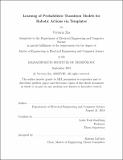Learning of probabilistic transition models for robotic actions via templates
Author(s)
Xia, Victoria(Victoria F.)
Download1098214664-MIT.pdf (1.349Mb)
Other Contributors
Massachusetts Institute of Technology. Department of Electrical Engineering and Computer Science.
Advisor
Leslie Pack Kaelbling.
Terms of use
Metadata
Show full item recordAbstract
In this work we present templates as an approach for learning probabilistic transition models for actions. By constructing templates via a greedy procedure for building up lists of deictic references that select relevant objects to pass to a predictor, we learn compact representations for a transition model whose training time and performance do not suffer from the presence of additional objects in more complex scenes. We present various algorithms for simultaneously separating training data into corresponding templates and learning template parameters, through the use of clustering-based approaches for initial assignment of samples to templates, followed by EM-like methods to further separate the data and train templates. We evaluate templates on variants of a simulated, 3D table-top pushing task involving stacks of objects. In comparing our approach to a baseline that considers all objects in the scene, we find that the templates approach is more data-efficient in terms of impact of number of training samples on performance.
Description
This electronic version was submitted by the student author. The certified thesis is available in the Institute Archives and Special Collections. Thesis: M. Eng., Massachusetts Institute of Technology, Department of Electrical Engineering and Computer Science, 2018 Cataloged from student-submitted PDF version of thesis. Includes bibliographical references (pages 71-72).
Date issued
2018Department
Massachusetts Institute of Technology. Department of Electrical Engineering and Computer SciencePublisher
Massachusetts Institute of Technology
Keywords
Electrical Engineering and Computer Science.